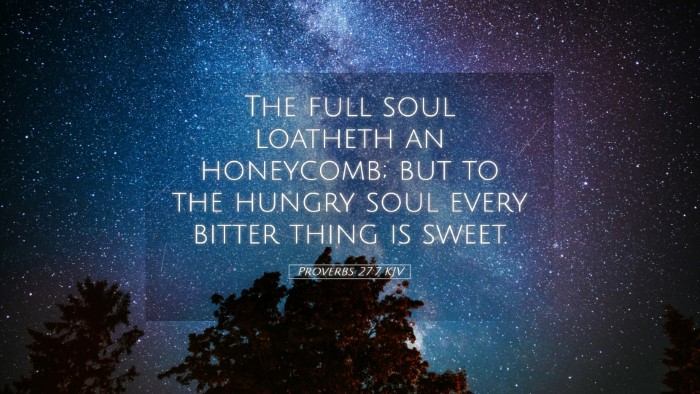Commentary on Proverbs 27:7
Verse: "The full soul loatheth an honeycomb; but to the hungry soul every bitter thing is sweet." (Proverbs 27:7)
Overview
This verse presents a profound contrast between two states of being: fullness and hunger. The imagery employed speaks to both physical and spiritual conditions. The sentiment expressed by Solomon is relevant across various dimensions of life and serves as a reminder of the value of true satisfaction that comes from need and desire.
Insights from Commentators
Matthew Henry
Henry's commentary emphasizes the spiritual significance of the things we crave. The "full soul," metaphorically representing those who are self-satisfied or complacent, fail to appreciate the sweetness of life's blessings. In contrast, the "hungry soul," symbolic of those striving for fulfillment, finds joy and worth even in the most unpalatable circumstances. Henry indicates that this proverb can be applied not only to physical food but also to spiritual nourishment. It suggests that those filled with the comforts of earthly possessions may overlook the divine richness that blesses the spiritually needy.
Albert Barnes
Barnes provides a practical perspective on the dichotomy presented in this verse. He argues that an overflowing abundance often breeds contempt for even the sweetest gifts of life, much like how those who are abundantly provided for may take for granted the provisions available to them. Conversely, those in need cherish even what is bitter, finding sweetness in hardship and deprivation. He points to the broader implications regarding satisfaction in life, underscoring how unmet needs can foster appreciation and gratitude. The implications extend to spiritual hunger, wherein believers may find richness in trials that strengthen their faith and reliance on God.
Adam Clarke
Clarke’s interpretation leans heavily on the context of satisfaction and the human condition. He remarks that the proverb serves as a reality check about contentment. A full soul is indifferent to the blessings of life, while a hungry soul appreciates everything, including the bitter experiences that come its way. Clarke also notes that this hunger need not be limited to physical hunger; rather, it can occur in the spiritual realm, which always seeks more of God’s essence. This hunger is a state of grace, where every drop of mercy, though perhaps seeming bitter initially, yields sweetness as one moves deeper into the experience of God’s presence.
Thematic Reflections
- Contrast of States: The juxtaposition of fullness and hunger serves as a metaphor for spiritual states. It encourages reflection on what it means to be truly satisfied versus being complacent.
- Value of Need: The proverb illustrates that need can enrich our experiences and result in a deeper appreciation of life’s gifts versus the indifference that often accompanies abundance.
- Spiritual Implications: This verse calls believers to recognize the importance of spiritual hunger, encouraging a pursuit of God where His bounty becomes evident in every bitter experience.
Applications for Pastors and Theologians
For pastors, this verse is an excellent reminder to address the spiritual hunger within their congregations. It serves as an encouragement to guide individuals towards recognizing their deep-seated needs for God’s presence and grace, and to value every experience, even those that seem harsh or bitter.
Theologians can use this verse as a springboard for exploring the dynamics of human desire, satisfaction, and the relationship with divine providence. The implications of regrettable abundance versus appreciative scarcity may be extrapolated to further examine socio-economic dimensions in biblical contexts.
Conclusion
Proverbs 27:7 serves as a poignant reminder of the duality of human experience, illustrating how our perception of abundance versus necessity shapes our interactions with the world around us. The insights from established commentators like Matthew Henry, Albert Barnes, and Adam Clarke enrich our understanding of this effective and profound proverb, driving home the necessity of cultivating spiritual hunger and gratitude in every circumstance. This passage not only guides us toward value and contentment but also challenges us to redefine what it means to truly be satisfied.


